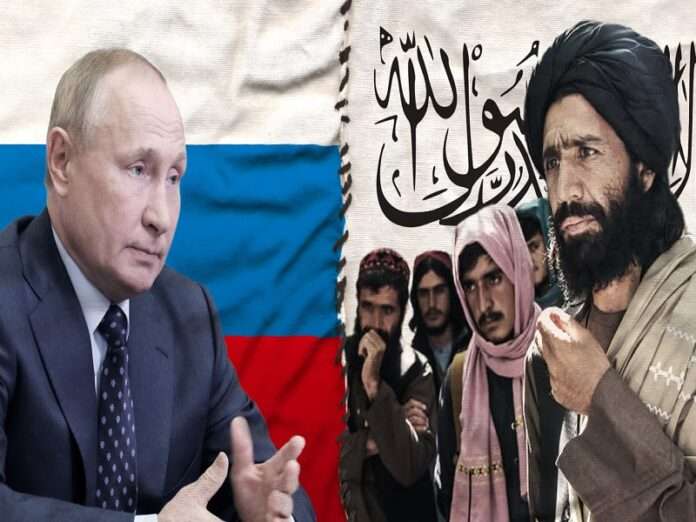The Taliban remain international outcasts due to their refusal to implement a truly ethno-politically inclusive government per their prior promises as well as their treatment of women. Although no tangible progress has been made on either of those two very sensitive issues, economic and security interests pushed regional stakeholders to enter into de facto relations with this group for pragmatic reasons. Out of all those that have done so, Russia is far ahead of them all as proven by these latest developments:
* 16 May 2024: “Afghan Taliban no longer Russia’s enemy — Russian diplomat”
* 17 May 2024: “Afghanistan to expand range of goods exported to Russia — deputy PM Overchuk”
* 24 May 2024: “Taliban can stabilize Afghanistan if left to its own devices — FSB director”
* 27 May 2024: “Russia invites Taliban to St. Petersburg International Economic Forum — Foreign Ministry”
* 27 May 2024: “Russian ministries propose to Putin to remove Taliban from terrorist list — envoy”
As can be seen, Russia’s previous threat perception of the Taliban has disappeared, and it now considers the group to be a regional security provider with respect to containing ISIS-K. Moreover, Afghanistan’s location enables it to facilitate Russian trade with Pakistan, both commercial and energy. These interests have combined to inspire Russia to more openly embrace this group, which comes ahead of next month’s investment forum and October’s BRICS Summit. Here are some detailed background briefings:
* 27 September 2021: “Comparing The Contours of Russia’s Ummah Pivot in Syria & Afghanistan”
* 19 August 2022: “The Taliban Envisions Russia Playing A Big Role In The Group’s Geo-Economic Balancing Act”
* 6 March 2023: “The Top Five Takeaways From The Russian Ambassador To Afghanistan’s Latest Interview”
* 16 June 2023: “Russia’s Afghan Point Man Hinted At The Possibility Of Military-Technical Ties With The Taliban”
* 19 May 2024: “Analyzing The Strategic Importance Of Russia’s Reportedly Planned Afghan Oil Hub”
Basically, Russia sees Afghanistan as an indispensable part of its larger geostrategic reorientation to Muslim-majority countries, while the Taliban believes that Russia can help their country preemptively avert potentially disproportionate dependence on China and especially Pakistan. They also have shared economic interests with respect to facilitating trade between Russia-Central Asia and South Asia via Afghanistan from which that transit country can profit accordingly to help rebuild its economy.
Something big is obviously in the works between them judging by the timing of Russia’s deliberations on removing the Taliban from its terrorist list just before next week’s St. Petersburg International Investment Forum. In all likelihood, not only does Russia expect to make progress on its reportedly planned Afghan oil hub, but there might even be an update about President Putin’s envisaged delivery of Russian pipeline gas to Pakistan through Afghanistan that he mentioned only once in September 2022.
This doesn’t mean that a deal will be clinched on either since that involves Pakistan finally agreeing to conclude their long-running talks on a strategic energy one, which it’s thus far been reluctant to do under American pressure since April 2022’s post-modern coup. Nevertheless, even a Memorandum of Understanding between Russia and Taliban-led but by-then presumably terrorist-delisted Afghanistan on this and/or a parallel railway would be significant since it could help move Russian-Pakistani talks along.
Therein lies the larger goal being advanced through the latest developments in Russian-Afghan relations, namely the comprehensive expansion of Russian-Pakistani relations, which is considered the last piece of Russia’s Ummah Pivot and Greater Eurasian Partnership concepts to be completed. That South Asian state of nearly one-quarter billion people is seen as a promising market for Russian commercial and energy exports as well as an overland gateway to India with whom Russia has decades-long strategic ties.
From the Kremlin’s perspective, the successful cultivation of Russian-Pakistani relations could enable Moscow to exert positive influence over Islamabad for politically resolving the Kashmir Conflict, most likely by simply formalizing the Line of Contact as the international border. That could then maximally unlock Eurasia’s geo-economic potential by creating a cross-continental corridor, but all of this is only in the best-case scenario, which is far from assured.
For instance, Pakistan might still refuse to budge with regards to reaching a strategic energy deal with Russia due to the previously mentioned American pressure, or it might agree to this but still remain at serious odds with India. Another factor is India’s reaction to the comprehensive expansion of Russian-Pakistani relations, especially if this results in Russia inviting Pakistan to participate in October’s “Outreach”/“BRICS-Plus” Summit, the potential political risks of which were detailed here.
In any case, it’s clear that the driving force for removing the Taliban’s terrorist designation and inviting it to next month’s investment forum is the desire to make tangible progress on reaching a strategic energy deal with Pakistan, which would complete its Ummah Pivot and Greater Eurasian Partnership. Hopefully these interconnected processes will proceed smoothly and not unfold in ways that inadvertently risk offending India. It’s a difficult task, but Russia’s diplomats are more than qualified to handle it.








